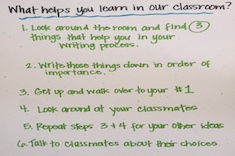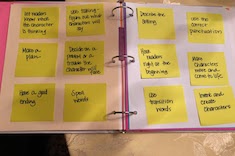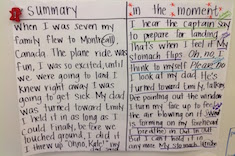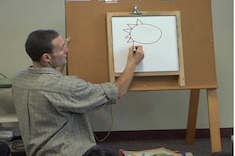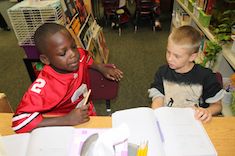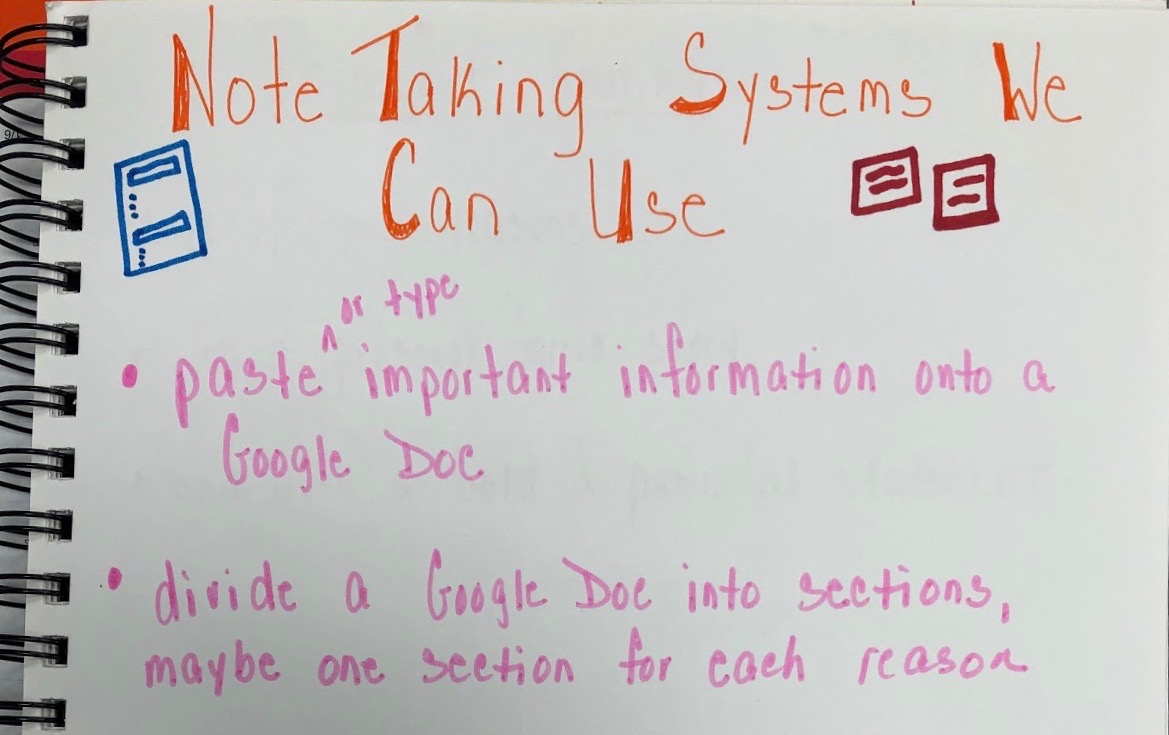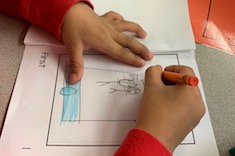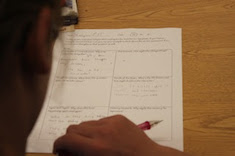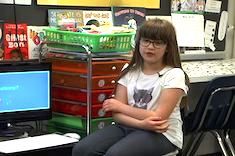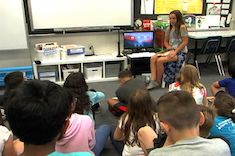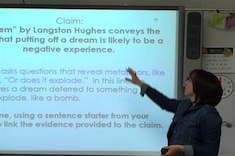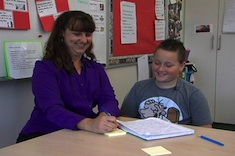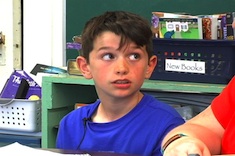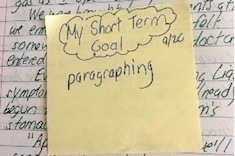Teaching Writing
Everyone who writes for Choice Literacy loves teaching writing, because we all write ourselves. We know it is "hard fun," as Donald Murray famously said—exasperating and exhilarating at the same time. The writing workshops you will read about here and see in our videos are busy, noisy, vibrant places. And most days, we wouldn't want to be anywhere else than in the midst of 'em! Here is where you'll find our latest discoveries, insights, and occasional boneheaded mistakes in teaching writing.
Latest Content
Mastering Conventions
Even eight-year-olds are expected to master a dozen or more conventions. Melanie Meehan shares a process for helping students focus on the small steps needed to master any convention with peer support.
Helping Students Understand What Works for Them
Want students to become more independent? Melanie Meehan recommends that you take each student through a reflective process to figure out what learning processes and habits work for them.
Building Reading Identities Across the Year
The start of the school year is often all about building reader identities in classrooms. And then October comes, and many of the activities that help students celebrate their reading histories and preferences are forgotten. Tara Barnett and Kate Mills share ways teachers can continue to help students define, refine, and expand their reading identities all year long.
Finding Time for Writing Shares
Finding time for writing share sessions may begin with trying out a few different options to see what works in your classroom. Melanie Meehan presents some of her favorites.
Big Table Writing
Max Brand uses the “big table” in his kindergarten classroom as a communal spot for writing. You can see how he interrupts students naturally to make quick suggestions, and allows some interruptions of his own writing as he works with his students.
Boosting the Confidence of Writers
We can teach students craft moves for their writing and how to punctuate. But how do we build their confidence? Melanie Meehan helps Aaron see his needs as a writer, but even more importantly, his strengths.
Charting Mentor Texts
Tara Barnett and Kate Mills share many of their favorite anchor charts for helping students connect writer’s craft to mentor texts.
Drawing and Learning in Kindergarten
Max Brand demonstrates basic drawing strategies early in the year, and then has his kindergartners attempt similar pictures. He explains how the exercise builds basic skills both in literacy and hand/eye coordination.
No Pictures Stinks!
Shari Frost remembers how she inadvertently stifled the creativity of one of her most enthusiastic first-grade writers. Her story has important lessons for all of us about the importance of voice and choice for learners of all ages.
Talking Through Characters
Melanie Meehan shares activities that help students talk about their characters before writing about them in a realistic fiction unit.
Student-Centered Notes
Dana Murphy discovers that what works for one student doesn’t work for another when it comes to note-taking. She provides options and then hosts a gallery walk so everyone can discover what works best for them.
Key Elements of Short Stories
Gretchen Schroeder finds her students’ enthusiasm for writing short stories flags quickly without some instruction and guidance.
Growing Toward Stories
Tara Barnett and Kate Mills use prompts and aids to help their youngest learners tell stories and find a writing voice.
Alternatives to Graphic Organizers
Dana Murphy is dismayed by the ways graphic organizers can sometimes limit student creativity. She uses writing notebooks and a few other strategies to begin to wean her fourth graders from depending too much on organizers.
Writer’s Notebook Tweaks
Gretchen Schroeder analyzes the use of writing notebooks in her classroom, focusing on what’s confusing or frustrating for students. She makes some small changes that yield big results.
Student-Led Minilession: Planning and Organizing Nonfiction Writing
Katie presents a student-led minilesson in Franki Sibberson’s fifth-grade class on organizing and planning nonfiction writing.
Digital and Disney: Conferring with Ben
It would be easy to zip quickly through a writing conference about a vacation story, especially one about a trip to Disney. In this video, Franki Sibberson slows down with Ben to explore how he is meeting his goal of adding descriptive language to writing, using digital tools to assist.
Stretching Writing in First Grade with Details
Bitsy Parks makes the home-school connection with first grader Grace early in the year as she writes about her birthday party.
A Fresh Take on Persuasive Writing
Louise Wrobleski uses video clips, children’s literature, and newspaper articles to teach middle school students new ways to craft persuasive writing.
Student-Led Minilesson: Annotating Reading with Sticky Notes
Students can claim who they are as readers and writers by designing and presenting minilessons to their peers. In this week’s video, fifth grader Reagan from Franki Sibberson’s classroom presents a lesson on annotating reading with sticky notes.
Scaffolding Revision with a Mentor Text
Tara Barnett and Kate Mills show how to break down mentor texts into brief excerpts for step-by-step scaffolding of writers in the intermediate grades.
Revising Literary Analysis Essays: Supporting Claims
Christy Rush-Levine presents a minilesson to her eighth-grade students about revising their literary analysis essays, using an analogy about putting furniture together.
Revising Dialogue in Narrative Writing
Melanie Meehan finds that a “lift the flap” strategy works for showing students different revision options with dialogue.
Practical Revision Strategies
If your students are equating revision with proofreading and final cleanups, Tara Barnett and Kate Mills have some practical revision strategies you might want to try.
5 Strategies for Engaging Boy Writers
Jennifer Allen has been fascinated with helping boys write for years, ever since her own son insisted on writing on the same topic over and over again. She shares her five favorite strategies for boosting interest in writing among boys.
Analyzing Voice: Conferring with Griffin
Gigi McAllister helps fourth grader Griffin re-engage with his writing by pointing out some of the unique qualities of voice and style his piece possesses.
The Importance of Correct Examples
Melanie Meehan explains why it is important to mentor students who are struggling with correct examples, and why she cautions writing teachers to avoid “find the mistakes” exercises.
Practical Advice for Dealing with Messy Handwriting
Do struggles with handwriting matter? They do when a student can’t even decipher his own words. Katherine Sokolowski confers with fifth grader Sauvi to help him find solutions to the problem.
Building Habits with Short-Term Goals
Tara Barnett and Kate Mills explain why short-term writing goals can help students reset expectations for their writing on a daily basis, and how they make these goals an integral part of their writing workshops.
When Students Set Intentions
When students set intentions, reflection and celebration go hand in hand. Melanie Meehan explains how teachers can help students become more explicit about intentions with practical cues from bulletin boards and index cards.
Browse Content By
Type
Category
- Assessment Tools
- Big Fresh Archives
- Booklists
- Choice Numeracy
- Classroom Design
- Common Core
- Community Building
- Conferring
- Content Literacy
- Digital Literacy
- English Language Learners
- Equity
- Family Relations
- Free Samples
- Guiding Groups
- Leadership
- Literacy Coaches
- Mentor Texts
- Minilessons
- New Teacher Mentors
- Podcasts
- Poetry
- Quote Collections
- Reading Strategies
- Self Care
- Struggling and Striving Learners
- Talking and Listening
- Teacher Study Groups
- Teaching Reading
- Teaching Writing
- Word Study and Vocabulary
Author
- Melissa Quimby
- Nawal Qarooni
- Gwen Blumberg
- Julie Cox
- The Lead Learners
- Hannah Tills
- Josie Stewart
- Ruth Metcalfe
- Mallory Messenger
- Becca Burk
- Jodie Bailey
- Vivian Chen
- Mary Brower
- Tiffany Abbott Fuller
- Stephanie Affinito
- Ruth Ayres
- Leigh Anne Eck
- Heather Fisher
- Shari Frost
- Julie Johnson
- Suzy Kaback
- Gigi McAllister
- Shirl McPhillips
- Melanie Meehan
- Cathy Mere
- Debbie Miller
- Tara Barnett and Kate Mills
- Tammy Mulligan
- Dana Murphy
- Bitsy Parks
- David Pittman
- Brenda Power
- Heather Rader
- Matt Renwick
- Mandy Robek
- Christy Rush-Levine
- Gretchen Schroeder
- Jen Schwanke
- Brian Sepe
- Katherine Sokolowski
- Stella Villalba
- Jennifer Vincent
Grade Level
Choice Literacy Membership
Articles
Get full access to all Choice Literacy article content
Videos
Get full access to all Choice Literacy video content
Courses
Access Choice Literacy course curriculum and training


